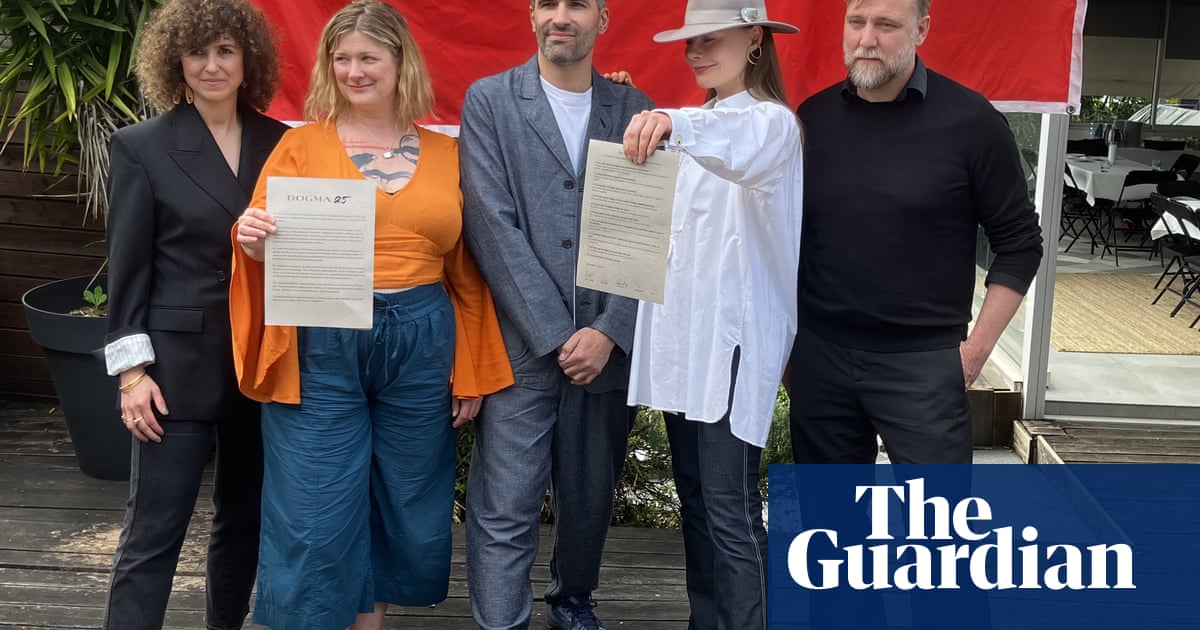A group of Danish and Swedish film-makers have relaunched the notorious avant garde Dogme 95 movement with a manifesto updated for the internet age, vowing to make five films between them in a year, from handwritten scripts and without using the internet or any emails in the creative process.
“In a world where film is based on algorithms and artificial visual expressions are gaining traction, it’s our mission to stand up for the flawed, distinct and human imprint,” said the five film-makers in a statement read at theCannes film festivalon Saturday.
Described in its manifesto as “a rescue mission and a cultural uprising”, Dogme 25 was founded in Copenhagen by 47-year-old Danish-Egyptian director May el-Toukhy, whose 2019 erotic dramaQueen of Heartswas that year’s Danish submission to the Oscars, and who has directed two episodes of British TV drama The Crown.
“After Covid, all prices have gone up and we get less film for the same amount of money,” El-Toukhy said. “That’s a huge problem for the arthouse film, because the risk-taking is gone. All mainstream stands on the shoulders of arthouse, and if the arthouse dies completely, there will be no originality left in the mainstream.”
El-Toukhy is joined in Dogme 25 by film-makers Milad Alami, Annika Berg and Isabella Eklöf, and visual artist Jesper Just, 50, though the movement is open to allowing further members.
Their manifesto has been endorsed by the two best-known directors to emerge fromthe original Dogme movement, Thomas Vinterberg and Lars von Trier, and established in collaboration with Zentropa, the film production company set up by Von Trier.
The low-budget ethos of Dogme 95 films such as Vinterberg’s Festen and Von Trier’s The Idiots went on to have a profound influence on contemporary cinema in Europe and beyond. Some 212 Danish and international films have been granted a Dogme certificate since its manifesto was launched in Paris in March 1995 – though many films associated with the movement, such as Von Trier’s Breaking the Waves and Dancer in the Dark, didn’t qualify because they failed to meet its strict“vows of chastity”.
Dogme 25 only retains one of the original manifesto’s self-imposed rules: that any film that is part of the movement must be “shot where the narrative takes place”.
The new movement’s 10 rules commit its followers to working from a script that “must be original and handwritten by the director”, to only accept funding “with no content-altering conditions attached”, and to have “no more than 10 people behind the camera”.
At least half of any Dogme 25 film must be without dialogue, “because we believe in visual storytelling and faith in the audience”. The use of makeup or any manipulation of faces and bodies is not allowed, and props used on set must be either “rented, borrowed, found or used”.
Most challenging of all, Dogme 25 films must be made “in no more than a year”, and the use of the internet “is off limits in all creative processes”. At the launch event in Cannes, Just clarified that this rule meant they would only be allowed to use email for administrative purposes during the one-year film-making phase.
“We’ve become so dependent on the internet that you think, ‘Wow, all my inspiration I draw from the internet,’” said Berg. “The point is to liberate ourselves from it because we are very vulnerable when we constantly are attached to big firms that can target us with algorithms.”
Swedish filmmaker Eklöf, whose filmHolidaywon best Danish film at the country’s annual Bodil awards in 2018, said she had already decided on the plot of her first Dogme 25 feature. “I was in a sadomasochistic relationship and I’ve never seen a film about that from a sort of naturalistic point of view,” she said. “I would really like to make a romantic, down to earth film about that.”
